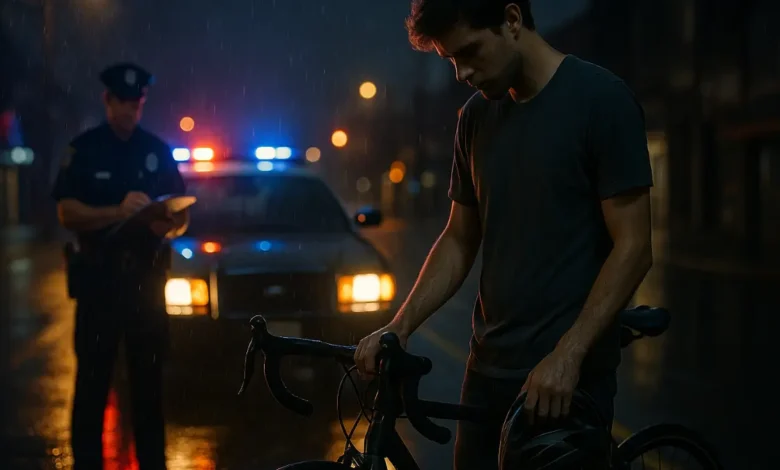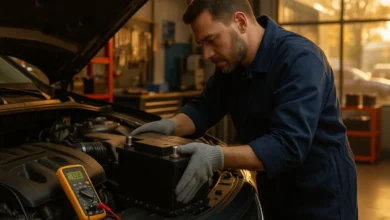Can You Get a DUI on a Bike Explained by Legal Experts and Road Safety Advisors

Can you get a DUI on a bike? Discover how DUI laws apply to cyclists, the real consequences of biking under the influence, and expert tips to stay safe, smart, and legal on the road.
Riding a bicycle after drinking may seem harmless, but legally speaking, it’s not always that simple. Many people assume DUI laws only apply to cars, but depending on where you live, you can actually get charged with a DUI while riding your bike. The rules differ from state to state, but one thing remains consistent — operating any vehicle, even a bicycle, while under the influence of alcohol or drugs can have serious consequences.
This guide breaks down everything you need to know about getting a DUI on a bike, the legal gray areas, and how to stay out of trouble. By the end, you’ll understand why this issue matters more than most cyclists realize.
Understanding What “Can You Get a DUI on a Bike” Really Means
The term “DUI” stands for “Driving Under the Influence.” However, many states interpret the word “driving” more broadly. In some cases, it can apply to anyone in control of a vehicle — even a non-motorized one like a bicycle. The question then becomes: does a bicycle count as a vehicle?
In many states, bicycles are legally defined as vehicles when operated on public roads. This means cyclists must obey the same traffic laws as drivers, including stopping at red lights and yielding to pedestrians. Therefore, when a cyclist rides while impaired by alcohol or drugs, it can be interpreted as operating a vehicle under the influence — opening the door to DUI or similar charges.
Even in states where the DUI statute only applies to motor vehicles, police may still cite a cyclist for related offenses. You might face charges like public intoxication, reckless cycling, or endangering others. These might not be called a “DUI,” but the penalties can still be serious — including fines, community service, or even jail time.
Why Cycling Under the Influence Is Still Dangerous
Some people think riding a bike drunk is safer than driving a car. After all, a bicycle moves slower and weighs less, right? Unfortunately, impairment is dangerous no matter the mode of transport. Alcohol and drugs reduce balance, reaction time, and awareness — three skills every cyclist needs to stay safe on the road.
An intoxicated cyclist can easily lose control, swerve into traffic, or miss signs and signals. Not only does this put the rider in danger, but it also risks the safety of pedestrians and drivers. A single lapse in judgment can cause a serious crash, and courts treat that risk as a public safety concern.
The reality is that cycling under the influence can result in real harm. If a drunk cyclist causes an accident that injures someone or damages property, they could be held financially and legally responsible. In such cases, the distinction between car and bike doesn’t matter much to the law — what matters is the reckless, impaired behavior.
How the Law Varies by State
Whether you can get a DUI on a bike depends heavily on your location. States across the U.S. interpret the issue differently, and their penalties range from minor fines to full-scale DUI convictions.
States Where You Can Get a DUI on a Bike
In several states, bicycles are legally treated as vehicles, meaning the same DUI laws apply. For example, states like Ohio, Oregon, and Florida have laws that specifically include bicycles in their definition of “vehicle.” This means a cyclist riding with a blood alcohol content (BAC) over 0.08% can be charged just like a drunk driver.
In these states, penalties may include fines, license suspension, mandatory alcohol education programs, and even jail time. In some cases, repeat offenders face stricter penalties, even if the offense involved a bicycle instead of a car.
States with Separate “Cycling Under the Influence” Laws
Some states, such as California and Colorado, handle things differently. Rather than applying full DUI laws, they have separate statutes for “cycling under the influence.” The penalties here are typically lighter — usually a fine of a few hundred dollars and no impact on your driving record. However, a conviction can still appear on your criminal record and affect future employment or background checks.
States Where You Can’t Technically Get a DUI on a Bike
There are also states that limit DUI laws to motorized vehicles only. In those areas, cyclists can’t be charged with a traditional DUI. That said, law enforcement can still find other ways to penalize intoxicated cyclists. You might be arrested for public intoxication or disorderly conduct, both of which carry their own consequences.
The takeaway is simple: even if your state doesn’t call it a “DUI,” it’s never a free pass to ride drunk.
The Real-World Consequences
Cycling under the influence can lead to a range of penalties depending on your state and the severity of the situation. Some common consequences include:
| Possible Consequence | Description |
|---|---|
| Fines | Monetary penalties ranging from small tickets to thousands of dollars for repeat offenses. |
| License Suspension | In some states, your driver’s license can be suspended even if the offense happened on a bike. |
| Criminal Record | A conviction for cycling under the influence may appear on background checks. |
| Jail Time | Severe or repeat offenses, especially those involving accidents, can lead to jail sentences. |
| Civil Liability | If you injure someone while riding drunk, you can be sued for damages. |
Even if the punishment isn’t as harsh as a full DUI, the aftermath can be costly and long-lasting.
Common Misconceptions About Bike DUIs
“It’s Not a Real Vehicle”
Many cyclists assume the law gives them a free pass because a bike isn’t motorized. This is one of the biggest myths. In many jurisdictions, bicycles are legally considered vehicles on the road. That means cyclists have both the rights and responsibilities of drivers — including staying sober while operating them.
“Police Won’t Bother With a Drunk Cyclist”
Another misconception is that officers won’t stop or arrest a cyclist for being drunk. In reality, police are trained to spot impaired behavior, regardless of the vehicle. If you’re riding erratically, ignoring signals, or putting others in danger, there’s a good chance you’ll be stopped.
“You Can’t Lose Your Driver’s License on a Bike”
In some states, you actually can. Courts may treat the offense as a violation of vehicle safety laws and impose driver’s license suspension — even though you weren’t in a car. This surprises many cyclists who thought they were avoiding that risk.
The Science of Impairment and Cycling
Alcohol affects cyclists much like it affects drivers. Studies show that even small amounts of alcohol can impair balance, coordination, and decision-making — skills essential for safe cycling. When your blood alcohol concentration rises, your ability to react to traffic, pedestrians, and sudden changes drops dramatically.
Cyclists often need quick reflexes to handle cars pulling out, pedestrians crossing, or uneven road surfaces. Impairment slows these reactions. Add in the fact that cyclists are physically exposed with little protection, and the risk multiplies.
Simply put: alcohol and bicycles don’t mix.
Legal and Ethical Responsibilities of Cyclists
Cyclists share public roads with drivers and pedestrians, which means they have a responsibility to operate safely. Choosing to ride impaired isn’t just a personal risk — it’s a public one. Legally, cyclists are expected to obey traffic signals, yield appropriately, and maintain control of their bikes.
Ethically, there’s also an element of responsibility toward others. A cyclist under the influence can cause harm to pedestrians or contribute to car accidents. Respecting the rules of the road helps keep everyone safe.
Tips to Avoid a DUI on a Bike
If you’ve had a few drinks and still need to get home, there are safer alternatives to hopping on your bike:
- Use a rideshare or taxi. It’s cheaper and safer than risking an arrest or injury.
- Walk your bike home. If you’re not steady enough to ride, walking is perfectly legal.
- Wait it out. Spend extra time at your destination until you’ve sobered up.
- Call a friend. A quick call might save you hundreds in fines and a mark on your record.
Being smart about it shows maturity and respect for the road — something every experienced cyclist should prioritize.
Expert Insight and Real Advice
Many legal experts agree that the intent of DUI laws is to protect everyone on the road, not to punish people for harmless fun. However, they also emphasize that impairment in any form of transportation increases the chance of harm. Police officers often prefer to use discretion, but if your behavior is dangerous, they won’t hesitate to act.
Ultimately, avoiding alcohol while cycling is the best way to stay safe and avoid legal trouble. It’s not worth the risk of fines, injury, or embarrassment — even if you think you’re riding “carefully.”
Frequently Asked Questions
Can you really get a DUI on a bike?
Yes, in many states you can. Laws differ, but if a bicycle is considered a vehicle, riding under the influence may lead to a DUI charge.
What happens if I’m stopped for biking drunk?
You could face fines, jail time, or other penalties depending on your state’s laws. In some cases, your driver’s license might be suspended.
Does a bicycle DUI go on your record?
It can, depending on the jurisdiction. Even if the charge isn’t technically a DUI, it may still show up as a criminal or traffic offense.
Can I refuse a breath test while on a bike?
You can, but refusal may result in separate penalties such as license suspension or fines — again, depending on local law.
What’s the safest way to avoid a DUI on a bike?
Don’t ride after drinking. Use a rideshare, call a friend, or walk your bike home.
Conclusion
So, can you get a DUI on a bike? Absolutely — in many places, yes. Even where the law doesn’t call it a “DUI,” you can still face legal consequences for cycling under the influence. The bottom line is that biking while drunk or high isn’t just unsafe — it’s legally risky.
Staying sober on your ride isn’t only about following the law; it’s about protecting yourself and others. Be smart, be responsible, and keep your cycling record — and conscience — clean.





